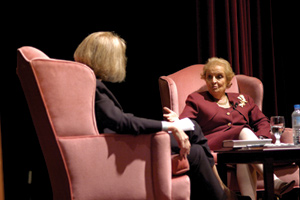|
||
      |
Politics and religion
Madeleine Albright advocates mixing the two conversational taboos to solve world problems.

Controversial topics: Madeliene Albright (right) speaks with Susan Thistlethwaite.
Some of Madeleine Albright’s government colleagues think “she’s lost her mind,” the former U.S. secretary of state admitted at International House’s Assembly Hall this spring. On campus to promote her book, The Mighty and the Almighty: Reflections on America, God, and World Affairs (HarperCollins, 2006), in an event sponsored by the World Behind the Headlines lecture series and the Chicago Theological Seminary (CTS), Albright sat onstage in a rose-colored upholstered chair opposite CTS President Susan Thistlethwaite, who led the conversation interview-style.
“I’m not pretending to be a religious ex--pert,” confessed Albright, whose book argues that religion, properly understood and harnessed, can help spark justice and peace. “The book tour is part of the learning process.” Her colleagues, she said, seem suspicious that “a foreign-policy practitioner is now looking at things in a different way. It’s as if I’ve made a mega-confession that we had done everything wrong in the Clinton Administration.”
In fact, Albright told the 500-plus, SRO crowd, she and the Clinton camp tried to understand religion’s role in the Middle East peace process, but their crucial realizations came too late—and inspired Albright to write her book. At the summer 2000 Camp David meetings, Israeli Prime Minister Ehud Barak was a willing participant, Albright recalled, but Yasser Arafat, president of the Palestinian National Authority, “did not want to come. I had to go to the region to persuade him.” At those meetings Barak noted that although Arafat “was perfectly entitled to make decisions about the size of the Palestinian territory, what he couldn’t make decisions about was holy places. He was not the only person in charge”—the Saudis and other leaders also held authority over religious sites. By the time Albright and Clinton grasped the situation’s complexity, it was too late to invite other leaders to join them. “I thought, we have really missed the boat in trying to understand the pressure Arafat is under.”
Thistlethwaite, who met Albright when they both sat on the Center for American Progress board, and who wrote a jacket blurb for the book, called Albright’s idea that holy places such as Jerusalem and Mecca “could be under divine sovereignty” a “groundbreaking” concept. She asked if the notion of American exceptionalism—the perception, endorsed by Albright, that the United States differs from other developed nations because of its unique origins, national credo, historical evolution, and distinctive political and religious institutions—could “lead us to temptation.”
“I do think we are an exceptional country,” Albright replied, “but we need to figure out how to use that power not to dominate but to have moral authority.” Current U.S. foreign policy, she argued, is “diminishing our exceptionalism.” Comparing the Iraq war with Vietnam, she said, “I hope I’m wrong, but I think Iraq will go down in history as the worst policy mistake in U.S. history, even worse than Vietnam, in terms of lasting effects” on international relations rather than in the number of American deaths. President Bush, she said, has not used America’s exceptionalism wisely. She doesn’t argue with the president citing religion as his motivator—“every American president,” she noted, “has invoked God in some form or another”—but she questions “the certainty with which he talks about his relationship with God.” She contrasted Bush, who “fully believes God is on our side,” with Abraham Lincoln, “who said we need to be on God’s side.”
After 9/11, Albright said, Bush gave the world a choice: “you’re either with people who fly planes into buildings, or you’re with us.” When he later named the “axis of evil” in the January 2002 State of the Union address, she said, “he changed the choice.” Then nations were either “for Guantanamo, for Iraq,” or against the United States—and the number of supporting countries dwindled. “If you’re so sure you’re right and have the absolute truth,” Albright said, “when plan A doesn’t work you don’t have a plan B.”
Yet some issues, she believes, could bring religious Americans—liberals and conservatives—together. Last November she and GOP Senator Sam Brownback of Kansas organized a conference in Washington to address problems such as human trafficking, genocide, and caring for refugees. A bipartisan group, she noted, rallied in Washington in May to protest the Darfur crisis. “The Right is interested in human rights; the Left is interested in human rights,” she said. “We can work together.”
Thistlethwaite asked if Albright—raised Roman Catholic, married an Episcopalian, and in the 1990s found out she had Jewish roots—considered herself on a religious journey. “But for choices made” after her family left communist Czechoslovakia for the United States in 1948, “I might have been going to synagogue instead of church,” Albright said. “I am very glad to have found out about my Jewish background, but I find it unnecessary to unlearn what I have learned. I know I believe in God. I find it interesting to find the common thread in all these religions.”
After a lively Q & A session, listeners bought copies of Albright’s book and, in a line stretching out the door, happily waited for her to sign them.